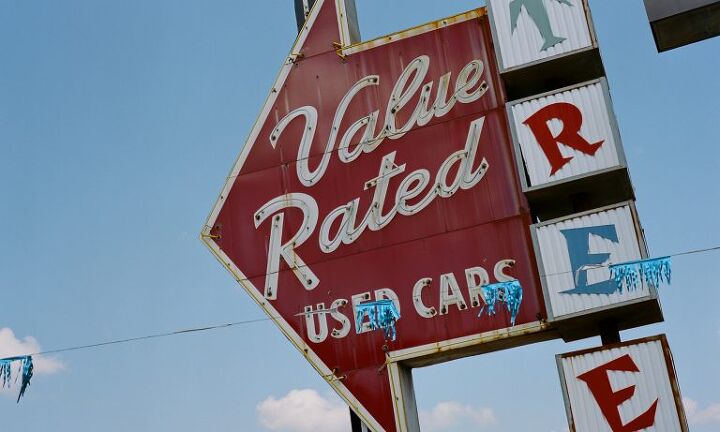Used Car Prices Are Falling, but Don't Worry - Lenders Are Still Raking in the Dough

Earlier this year, auto lenders assured us that the stagnating car market and an unprecedented number of off-lease vehicles flooding into used vehicle lots would coalesce into the perfect storm of unprofitability. However, despite stoking the flames of terror at the beginning of the year, automotive lenders are doing just fine.
We’re sure you’re all very pleased to read car financiers are still doing so well and have likely collectively exhaled a sigh of relief. But there’s more good news. Some of these companies aren’t just surviving, they’re thriving. Several have even reported record high profits, even though used car prices continue to fall. It may be time to pop the champagne corks, pour out the bubbly, and hoist our glasses for the financial institutions we all love so dearly.
Since the previously assumed doom for lenders was focused around the impending glut of pre-owned vehicles, there was no way used auto prices wouldn’t fall. However, thanks to the high default and repossession rate of lessees over the last few years, banks have tightened up their standards and essentially forced a bunch of people into the used vehicle market. This has kept demand higher than expected and kept the value of pre-owned automobiles from falling quite as far as anticipated.
According to Bloomberg, more people with bad credit and less money was exactly what this situation needed. Ally Financial, formerly GMAC, reported record earnings for the second quarter while Ford Motor Credit Company claimed its highest pretax profitability since 2011.
Ford CFO Bob Shanks said lease residuals were flatter in the second quarter than anyone had expected. “I think that’s a victory,” Shanks said on a July 26th earnings call. “That’s been one of the biggest headwinds of the business now for quite a number of quarters, but as it has been written about by many of you and others in the media, we are seeing less of a downward draft on auction values than what we had expected.”
For larger banks, like Wells Fargo, pulling out of auto lending has given financial institutions that make it their primary business more room to breathe. Capital One Financial Corp., which specializes in loans almost exclusively, said it didn’t miss the competition while its auto originations grew 14 percent from a year ago to roughly $7.5 billion. However, it did express some mild concerns over continued falling auction prices and “an increasingly indebted consumer.”
In fact, all of that debt has actually hurt subprime auto lenders and kept them from enjoying the same recovery rates as the more varied banking institutions.
The party is unlikely to last forever, though. Ed Groshans, a bank analyst at Height Securities LLC, said heavy declines in used car values will probably resume in the next quarter. “I’ve been surprised at how well the pricing has held up through the first of the year, because none of the trends changed,” he said. “Something has to give as we go forward.”
Auto lenders seem to be in agreement. For the most part, they all seem to see the summer’s profitability as an unpredictable anomaly.
“From a macro perspective, the consumer is still in good shape,” Jeffrey Brown, Ally’s chief executive officer, told Bloomberg. “Confidence is high, debt loads are manageable, employment is still strong right now.” However, he’s maintaining a 7 percent depreciation forecast for 2017, and expects another 6 to 7 percent cumulative drop for 2018 and 2019.

A staunch consumer advocate tracking industry trends and regulation. Before joining TTAC, Matt spent a decade working for marketing and research firms based in NYC. Clients included several of the world’s largest automakers, global tire brands, and aftermarket part suppliers. Dissatisfied with the corporate world and resentful of having to wear suits everyday, he pivoted to writing about cars. Since then, that man has become an ardent supporter of the right-to-repair movement, been interviewed on the auto industry by national radio broadcasts, driven more rental cars than anyone ever should, participated in amateur rallying events, and received the requisite minimum training as sanctioned by the SCCA. Handy with a wrench, Matt grew up surrounded by Detroit auto workers and managed to get a pizza delivery job before he was legally eligible. He later found himself driving box trucks through Manhattan, guaranteeing future sympathy for actual truckers. He continues to conduct research pertaining to the automotive sector as an independent contractor and has since moved back to his native Michigan, closer to where the cars are born. A contrarian, Matt claims to prefer understeer — stating that front and all-wheel drive vehicles cater best to his driving style.
More by Matt Posky
Latest Car Reviews
Read moreLatest Product Reviews
Read moreRecent Comments
- Zipper69 A Mini should have 2 doors and 4 cylinders and tires the size of dinner plates.All else is puffery.
- Theflyersfan Just in time for the weekend!!! Usual suspects A: All EVs are evil golf carts, spewing nothing but virtue signaling about saving the earth, all the while hacking the limbs off of small kids in Africa, money losing pits of despair that no buyer would ever need and anyone that buys one is a raging moron with no brains and the automakers who make them want to go bankrupt.(Source: all of the comments on every EV article here posted over the years)Usual suspects B: All EVs are powered by unicorns and lollypops with no pollution, drive like dreams, all drivers don't mind stopping for hours on end, eating trays of fast food at every rest stop waiting for charges, save the world by using no gas and batteries are friendly to everyone, bugs included. Everyone should torch their ICE cars now and buy a Tesla or Bolt post haste.(Source: all of the comments on every EV article here posted over the years)Or those in the middle: Maybe one of these days, when the charging infrastructure is better, or there are more options that don't cost as much, one will be considered as part of a rational decision based on driving needs, purchasing costs environmental impact, total cost of ownership, and ease of charging.(Source: many on this site who don't jump on TTAC the split second an EV article appears and lives to trash everyone who is a fan of EVs.)
- The Oracle Some commenters have since passed away when this series got started.
- The Oracle Honda is generally conservative yet persistent, this will work in one form or fashion.
- Theflyersfan I love this car. I want this car. No digital crap, takes skill to drive, beat it up, keep on going.However, I just looked up the cost of transmission replacement:$16,999 before labor. That's the price for an OEM Mitsubishi SST. Wow. It's obvious from reading everything the seller has done, he has put a lot of time, energy, and love into this car, but it's understandable that $17,000 before labor, tax, and fees is a bridge too far. And no one wants to see this car end up in a junkyard. The last excellent Mitsubishi before telling Subaru that they give up. And the rear facing car seat in the back - it's not every day you see that in an Evo! Get the kid to daycare in record time! Comments are reading that the price is best offer. It's been a while since Tim put something up that had me really thinking about it, even something over 1,000 miles away. But I've loved the Evo for a long time... And if you're going to scratch out the front plate image, you might want to do the rear one as well!


































Comments
Join the conversation
" said heavy declines in used car values will probably resume in the next quarter." O.K. then ; I guess I'll slap two recap tires on the back end do a major tune up and HOT oil and filter change on every thing, change the coolant and hope the tranny lasts until Christmas when prices on vehicles drop precipitously . This was the Farmer's/Blue Collar motto when I were a lad . Here in La La Land, (hope to Fruits, Nuts and Flakes), I use loan sharks off and on but you'd better believe I knew damn well I could make every payment ON TIME as a mechanic with anything broken, is worthless in any shop . One of my Equipment Operator buddies when I was still @ L.A.P.D. caught wind of this and had fits thinking I was going to get killed . Live in a rusty trailed as a Child and you typically figure out how to manage things of you're stuck in a Crab Spirits (!MISS YOU!) tale until you're dead . -Nate
The auto industry doesn't have much to worry about for the time being. The average consumer lacks the sophistication to negotiate personal lines of credit or auto loans from banks. More importantly, the average consumer has too little cushion in their budget to quickly payback an auto loan or personal loan that may not have the best terms of credit. Therefore, the dealers are about the only show in town for most car buyers. The dealers can control supply and demand to a degree (through credit negotiations); therefore, the dealers can exert some control over residuals in the near term. However, dabbling in residual value manipulation is a risky strategy, and a lot of people are going to get burned badly in the long run, if they aren't able to keep used vehicles moving. The program of coordinated buying will become an unintentional dumping of used cars in a giant fire sale. Businesses hate to take their medicine because they are all paid an meaningless short term metrics that ebb and flow during normal business cycles. Attempting to manipulate the market in the long run is a fool's errand. If the auto manufacturers start lobbying for a new cash for clunkers, a used car apocalypse is surely waiting in the wings.